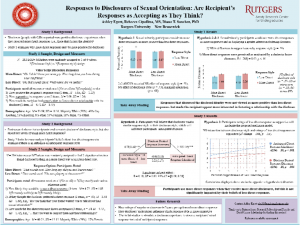Egert, Ashley: Responses to Disclosures of Sexual Orientation: Are Recipient’s Responses as Accepting as They Think?
Title: Responses to Disclosures of Sexual Orientation: Are Recipient’s Responses as Accepting as They Think?
Name: Ashley Egert
Major: Psychology
School affiliation: School of Arts and Sciences
Programs: Aresty – Research or Conference Funding Recipient, Honors Capstone
Other contributors: Diana T. Sanchez and Rebecca Cipollina
Abstract: There is an abundance of literature on the disclosure experiences of individuals with concealable (i.e., not visible) stigmatized identities (e.g., sexual orientation) that suggests that positive disclosure experiences can benefit disclosers in multiple ways, including improving their health outcomes (Weisz, Quinn, & Williams, 2015). To our knowledge, our lab is the first to look at discloser’s and recipient’s communication styles in facilitating positive disclosure experiences. For example, an individual can disclose their identity in a more direct way (e.g., “I am gay”) or a less direct way (e.g., “I went to the movies with my boyfriend this weekend”) and recipients can respond in a more direct way by acknowledging the identity or in a less direct way by continuing the conversation as normal. In Study 1, sexual minorities watched videos of disclosures that varied in directness of disclosure and response and reported their perceived positivity of the disclosures. We found no significant differences in perceived supportiveness by response type, but more direct responses were seen as wanting to foster a relationship with the discloser. In Study 2, heterosexual participants were assigned to one of two vignette conditions in which they were told to imagine that a friend disclosed to them. We then asked participants to rate two responses that varied in directness on several scales (e.g., perceived supportiveness). We found that disclosure style influenced what style of response the recipient believed the discloser as wanting, which in turn influenced recipient’s response style. However, our proposed moderator of less direct response supportiveness did not significantly influence the relationship between disclosure style and believed desired response directness.
